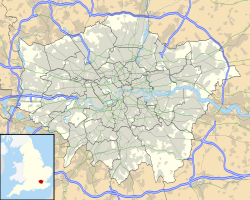
Summary
The Buckingham Gate drill halls were military installations at 58 and 59 Buckingham Gate, London.
| Buckingham Gate drill halls | |
|---|---|
| London | |
 58 (centre) and 59 (beyond) Buckingham Gate | |
 Buckingham Gate drill halls Location within London | |
| Coordinates | 51°29′53″N 0°08′11″W / 51.49815°N 0.13641°W |
| Type | Drill halls |
| Site history | |
| Built | 1886 |
| Built for | War Office |
| In use | 1886-Present |
History edit
58 Buckingham Gate edit
The building was designed as the headquarters of the 13th Middlesex (Queen's Westminster) Volunteer Rifle Corps and completed in 1886.[1] That unit became the 16th (County of London) Battalion, London Regiment (Queen's Westminster Rifles) in 1908.[2] The battalion was mobilised at the drill hall in August 1914 before being deployed to the Western Front.[3]
In 1937, on the break-up of the London Regiment, the unit based at the drill hall was redesignated the Queen's Westminsters, King's Royal Rifle Corps.[4] The regiment amalgamated with the Queen Victoria's Rifles in 1961[4] and moved out to the Davies Street drill hall.[2]
In the 1970s the drill hall was used by the Army Cadet Force Association[5] and, in the late 20th century, it was used extensively by the Metropolitan Police Service.[6] It still survives and is currently used as a conference facility.[7]
59 Buckingham Gate edit
The building was designed by John Macvicar Anderson as the headquarters of the 7th (London Scottish) Middlesex Volunteer Rifle Corps[8] and was opened by the Duke of Cambridge in July 1886.[9] From 1899 to 1901 the All England Open Badminton Championships were held in the drill hall.[10] The 7th (London Scottish) Middlesex Volunteer Rifle Corps became the 14th (County of London) Battalion, London Regiment (London Scottish) in 1908.[2]
In May 1912 the drill hall was used as the location for the inquiry into the sinking of RMS Titanic.[11]
In August 1914, the 14th (County of London) Battalion was mobilised at the drill hall before being deployed to the Western Front.[3] In 1937, on the break-up of the London Regiment, the unit based at the drill hall was re-designated as The London Scottish, The Gordon Highlanders.[12]
In April 1944, during the Second World War, Princess Elizabeth visited a Sea Scouts exhibition at the drill hall.[13] In 1947 the regiment was reconstituted but with its headquarters still at the drill hall.[14]
The drill hall was demolished in 1985[15] and parts of the structure, including the wrought-iron roof, the double-level iron galleries and the war memorials, were relocated to the new Horseferry Road drill hall.[8] The Buckingham Gate site has since been redeveloped for offices and the Swire Group now occupies the office block on the site.[16]
References edit
- ^ Osborne, p.247
- ^ a b c "Drill Hall Register: A list of the locations of London Drill Halls since 1908" (PDF). Archived from the original (PDF) on 26 September 2017. Retrieved 14 May 2017.
- ^ a b "The London Regiment". The Long, Long Trail. Retrieved 21 May 2017.
- ^ a b "The Queen's Westminsters". Regiments.org. Archived from the original on 4 January 2006. Retrieved 28 May 2017.
{{cite web}}: CS1 maint: bot: original URL status unknown (link) - ^ "The Queen's Regiment Magazine - March 1973". Retrieved 28 May 2017.
- ^ "Metropolitan Police Service". View.co.uk. Retrieved 28 May 2017.
- ^ "58 Buckingham Gate" (PDF). Tuckerman. Archived from the original (PDF) on 29 June 2019. Retrieved 28 May 2017.
- ^ a b "London Scottish Regimental Headquarters, Drill Hall, 59 Buckingham Gate, Marylebone St Johns Wood And Mayfair, Greater London". Historic England. Retrieved 28 May 2017.
- ^ "Opening by the Duke of Cambridge of the New Head-Quarters and Drill-Hall of the London Scottish Rifle Volunteers". Look and Learn. Retrieved 28 May 2017.
- ^ Uber, Betty (2011). A Brief History of Badminton from 1870 to 1949. Read Books. ISBN 978-1447437437.
- ^ Gibson, Allen (2012). The Unsinkable Titanic. The History Press. ISBN 978-0752467856.
- ^ "A Company history". Ministry of Defence. Retrieved 27 May 2017.
- ^ "Princess Elizabeth visits Sea Scouts exhibition at the London Scottish Drill Hall, Buckingham Gate". Royal Collection. Retrieved 28 May 2017.
- ^ "The London Scottish". Regiments.org. Archived from the original on 4 January 2006. Retrieved 28 May 2017.
- ^ "London Scottish Regiment H.Q." Plaques of London. Archived from the original on 19 May 2018. Retrieved 28 May 2017.
- ^ "Offices". John Swire & Sons. Retrieved 28 May 2017.
Sources edit
- Osborne, Mike (2006). Always Ready: The Drill Halls of Britain's Volunteer Forces. Partizan Press. ISBN 978-1858185095.


